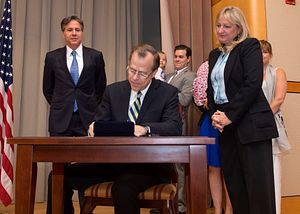New U.S. Ambassador to Thailand Glyn Davies arrived in Bangkok this week after the senior post remained vacant for nearly a year amid troubled times for bilateral ties. The seasoned envoy, a 35-year veteran in America’s diplomatic corps, will be tasked with steering relations in the wake of last year’s military takeover and rising perceptions that China has stolen a march through overtures towards Prime Minister Prayut Chan-o-cha’s rights-curbing government.
Thai-U.S. ties are arguably at their lowest point in decades, crucially at a time when Washington is bidding to marshal regional support for its China-containing ‘pivot’ policy. Outgoing U.S. ambassador Kristie Kenney staked out a hard line against the coup, a position the State Department has maintained on democratic principle to the detriment of the wider strategic relationship. Kenney’s stance has so far outweighed the views of Thailand specialists in Washington who have called for a more nuanced approach to guard the United States’ considerable economic and strategic interests in the country.
Critical remarks made by U.S. Assistant Secretary of State for East Asian and Pacific Affairs Daniel Russel at a Bangkok university in January saw Thailand’s Foreign Ministry reciprocally summon and upbraid charge d’ affaires W. Patrick Murphy. The diplomatic dressing down, reported widely in local media, was viewed as unprecedented for the long-time strategic allies. Murphy, a Myanmar specialist who has ably acted as the United States’ top envoy in Bangkok since Kenney’s departure in October, has maintained Washington’s drumbeat call for a speedy restoration of democracy and a reversal of curbs on rights and liberties.
Yet some Bangkok-based observers have sensed a softening of Kenney’s line under Murphy’s watch. While high-level strategic dialogue is still suspended, a September 1 meeting between U.S. National Aeronautics and Space Administration (NASA) administer Charles Bolden and Science Minister Pichet Durongkaveroj aimed to resume bilateral cooperation. A NASA request in 2012 to conduct a regional climate study from Thailand’s U-Tapao air base was cancelled during the Yingluck Shinawatra government amid partisan accusations of possible ulterior motives involving her self-exiled former premier brother, Thaksin Shinawatra.
Reports at the time also speculated that China had weighed against the project on concerns that U.S. satellites, beyond measuring weather patterns, could be trained to spy on Chinese territory from Thai air space. U.S.-Thai intelligence sharing, ranked by a leaked National Security Agency document as among the U.S.’s top dozen or so partners in the world before the coup, has since been downgraded significantly, according to people familiar with the situation. That was apparent in Thailand’s refusal to accept offered U.S. Central Intelligence Agency and Federal Bureau of Investigation assistance in investigating the still unexplained bombing attack that killed 20 people in Bangkok on August 17.
Davies, a former special representative for North Korea policy and to the United Nations’ International Atomic Energy Agency, is widely respected in Washington for his diplomatic management of high-stakes political imbroglios. His appointment has signaled to some that the U.S. may give higher priority to the relationship, after dispatching a series of less distinguished and sometimes disinterested envoys. Many officials and analysts in Bangkok argue that former U.S. Ambassador to Thailand Ralph “Skip” Boyce, a fluent Thai speaker with top connections across the political spectrum, was the last top American diplomat to see clearly through the country’s complex, personality-driven politics.
Government advisors have bid to manufacture a soft-landing for Davies. Prior to his arrival in Bangkok, Davies received personal calls from Privy Councilors, royal advisors to King Bhumibol Adulyadej, welcoming his appointment, according to a source familiar with the communications. (In one of his first moves as ambassador, Davies on Friday visited the Grand Palace to pay respects and wish good health to the king.) That royal treatment contrasts with Kenney’s initial reception in 2010, where she was scolded by Privy Council President and long-time U.S. ally Prem Tinsulonanda for the leak of confidential U.S. cables, including one that detailed a meeting he and other royal advisors held with Boyce to discuss sensitivities around the royal succession. It’s unclear if that meeting, which Kenney later described to confidantes as among the toughest of her career, colored her diplomacy in favor of Prime Minister Yingluck Shinawatra and her family clan’s affiliated ‘Red Shirt’ pressure group.
If Davies aims to recalibrate relations towards more engagement to counter China’s post-coup advances, he will be hard-pressed to justify the policy U-turn. A military-appointed council’s rejection of a draft constitution on September 6 will further delay the junta’s roadmap to new elections from 2016 to 2017, undermining Prayut’s earlier pledge to quickly restore elected civilian rule. While vowing to institute “democratic” reforms, the military is simultaneously building a police state bent on ferreting out and squashing dissent. The recent three-day detention of journalist Pravit Rojanaphruk, where the outspoken scribe was blindfolded and held incommunicado by surgical mask-wearing plainclothes commandos, signaled a turn towards more hard-knuckled repression of critical voices.
Many fear that style of repression will intensify as the royal succession draws nearer amid mounting signs it may be contested by competing military, political and royalist camps. While the United States has publicly pushed for a rapid restoration of democracy, it has no doubt by now dawned on American policymakers that Prayut intends to stay in power until the succession is secure. While many in Bangkok call for stronger measures against Prayut’s assault on rights, including a new whisper campaign led by pro-Yingluck soldiers calling for an arms embargo, Davies will simultaneously need to counter perceptions in Washington that his predecessor’s style of diplomacy pushed Thailand towards China at a crucial strategic juncture. How Davies strikes that policy balance will go a long way in determining whether the United States is on the right or wrong side of Thailand’s post-succession history.
































